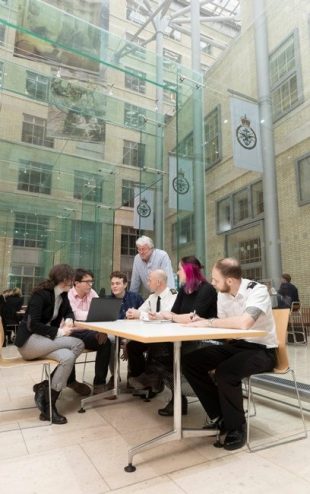In the first of a two-part series, one of the trailblazers of user research in Defence, Dr Silvia Grant, shares some of her insights from conducting user research with the Armed Forces.
As the Defence Digital Service (DDS) celebrates its first anniversary, we’ve been reflecting on what we’ve achieved so far. One of things we’re most proud of is how we’ve helped establish and cement a user-centred service design approach in MOD. A year or so ago the use of professional user research to inform the design of digital services was rare. But now, there is a small and growing community of user researchers across Defence, and it’s starting to result in better digital services for our users.
I’m Silvia, the Lead User Researcher for DDS, and in this two part-series, I’ll share some ideas on how user research (UR) and user-centred design can tackle some of the big challenges for our users in UK Defence.
As we grow our user research (UR) function and get involved in new challenges and discoveries, we are also refining our user research values and objectives. Our user research approach is closely intertwined with the DDS values, and rapid delivery-focused strategy both in the office and in the battlespace. As in other large government Departments, our user base is both wide and deep, with specialist needs. Catering for this variety of users is a challenge we gladly design for.
The following principles help us think about the big picture, whilst retaining individual focus on Defence-specific user needs.
Our research ethos
User researchers in Defence come from a variety of backgrounds. Whether approaching UR Defence conundrums from a digital, business, human factors, market research, psychology, academic, data science, sociology or indeed a military background, what ultimately counts is the questions we ask, and the actionable insights we can draw from them.
Mixed methods are the norm within MOD work. Often data for research will come in a wide spectrum, and there is no right or wrong methodology to analyse it. Conventional user research good practice informs the standards to which this is delivered, such as well-crafted discussion guides for in-depth interviews, protocols for moderated usability sessions, contextual use of descriptive and inferential statistics from surveys or existing datasets, well-crafted user journey maps, and guerrilla interviewing. Empathy is an essential part of this process, and that’s where creative problem-solving skills really help tackle some of the knotty problems in Defence.
We do not have a suggested number of interviews to carry out during a Discovery, or format to express complex user needs. We in fact encourage organic user-led and validated solutions, not necessarily aligned to business needs requirements (if found not to be).
Despite the military rank system and hierarchy ingrained in the Defence structure, we are proponents of a flat, innovative digital culture putting users at the centre of our problem-solving. This helps our strategy to remain delivery-focused, and unblock policy issues up the chain.

No job is too big, no task is too small
Whether researching and designing an all-singing, all-dancing system for our hundreds of thousands of users, or enhancing small internal web-apps, the single improvement which brings immediate and tangible benefits to Defence users, is performing user research and delivering to user-centric standards. Simply put, if it brings value to the user, then it’s a project where user research can be deployed.
We don’t discriminate by number of transactions when picking projects to work on, but focus on other measures of impact and qualifiers, such as being sufficiently enabled by senior sponsorship, to ensure a clear path to delivery.
Partnerships and collaborations
DDS values were partly inspired by the US Defense Digital Service. We have a strong working partnership with our US counterparts, embedded in our day-to-day team working. GDS is also a robust presence in our work, as we are keen to learn from digital champions, and we learned a lot by going through an assessment for one of our services. This is great news for user research and user-centred design, as user needs are firmly at the centre of this innovation.
Despite the cultural tendency in Defence towards secrecy, we champion transparency and learning sharing. Particularly when it comes to sharing user research findings, there is formidable value in sharing research data within different commands in the MOD, and user learning wider in the Defence or cross-government community.
We recently held a productive workshop with Navy Digital Service’s UX professionals to draw out user needs and pain points common across the Royal Navy and MOD, as well as a persona sketching session. It turns out that information access problems have a consistent pattern for users across different Commands, ranks, and roles. We will share more findings on this soon, in a joint post with the Navy Digital Service. These exercises are essential for understanding our cross-Defence needs.

Next steps
As part of our next steps, we are looking to expand these partnerships and collaboration sessions, spearheaded by a strong user research community of practice.
As our partnerships with industry grow, we are faced with new opportunities to inject primary research and user insights into digital projects which would have otherwise been led by pre-established priorities. As our National Cyber Force and upcoming Space Force are established, we also look forward to supporting and working with them.
Just as with our interest in defining Defence accessibility priorities, and in bolstering the service standard, we are keen to understand and map out the ethics challenges across our Defence projects and services. Ethical considerations in Defence are multifaceted and complex. There is remarkable work in academic research around the ethics of global Defence, and we are eager to bring those considerations into our digital ways of working.
The next blog article will explore some of the practical applications of User Research in Defence, and wider considerations of researching with the Armed Forces.
Get in touch
If you are interested in working for user research in Defence, please get in touch, and we’ll let you know when we advertise new roles.
You can also join the conversation on Twitter and follow DDS on @Digital4Defence.
Leave a comment